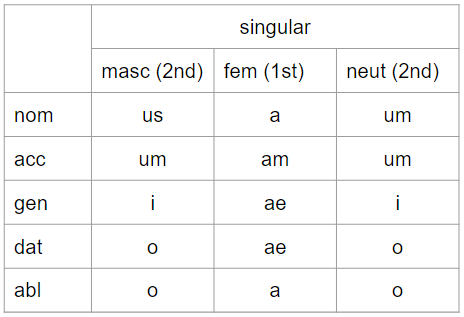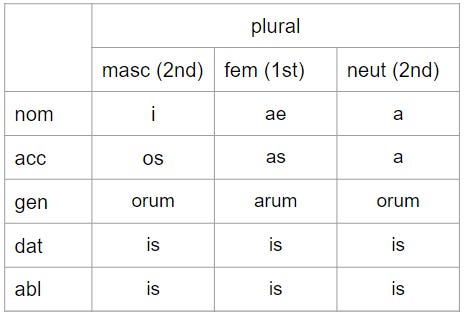Perfect Active Participles
Deponent Verbs Strike Again!
Today I’m going to be going through perfect active participles. These ones are kind of weird and I will explain why. If you missed my post about deponent verbs, you can find it here in the bambasbat archive - Day 22 of the bambasbat January Challenge.
Welcome back to bambasbat. In this post, we're going to be talking about participles and what that means is we're going to need our noun endings to be really secure. That’s because participles are basically adjectives, and adjectives use noun endings, so if you've forgotten them, download my free noun endings guide from here. It'll really help you just to have it to hand and they're really useful to learn anyway. So get on that if you haven't already.
What is a participle?
A participle is what's called a verbal adjective. Now we break that down into two parts.
It's formed from a verb, so it's verbal.
But it's an adjective because it declines just like an adjective.
It has a tense because it is formed from a verb, but it declines like an adjective, so it has number, gender, and case, and it has to match the noun that it's describing in all those three things, just like an adjective.
Types of participle
There are four types of participle that we really need to know.
Present active participles: carrying
Perfect passive participles: having been carried
Future active participles: being about to carry
Perfect active participles: having spoken
The next bambasbat post will be a rapid run down of all of these, so make sure you are subscribed so you don’t miss it!
Perfect Active Participles
Now these are what we're looking at today. These are for deponent verbs only.
Perfect active participles are actually quite weird. I really like them because, as you all know, I like weird grammar points in Latin. That's why I do this. But anyway…
Perfect active participles are formed from the third principal part of a deponent verb.
Now, that is very different to perfect passive participles and future active participles, which are formed from the fourth principal part of Latin verbs.
However, deponent verbs do not have four principal parts, they only have three. So the perfect active participle is formed from that third principal part.
hortor hortari hortatus sum
That third principal part, hortatus sum, is the perfect stem of this verb. Because it's deponent, it doesn't have the fourth principal part, because it is included within this perfect stem. I don't need another one, it already tells me. The 4th part would be hortatus, but as we can figure that out by taking the sum off the perfect stem, why waste space in a dictionary!
Remember these are the sneaky verbs
They are passive in form but active in meaning. So although hortor looks like it should be passive (with the -r, -ris, -tur… endings) you translate it actively - “I encourage”.
Why “perfect”?
Because they describe an action that has already happened when the main verb occurs. The action of the participle is complete when the main action takes place.
OK we get the verb bit. What’s with the adjective part?
Perfect active participles, like all participles, match the noun they're describing in case, number, and gender.
They decline like 2-1-2 adjective. What that means is they use the 2nd declension, 1st declension, and 2nd declension neuter endings, depending on the gender of the noun they are describing.
Take the 3rd principal part: hortatus sum.
To get the participal, take off the verb “to be”, the sum, that's on the end of the third principal part, and then simply add the endings to that.
Remember, they can be in any case as they have to match the noun they are describing. Again, don't worry about learning them right now after this one post, because you can download my free noun endings guide here and have it to hand while we go through these, as well as for the future.
Let's have a look at an example sentence:
nuntius locutus discessit
“The messenger, having spoken, left”
This can look a little bit confusing if you're not sure about your deponent verbs, as you might not guess that locutus is deponent, not passive. However, you probably know by now that locutus is one of my favourite deponent verbs, so obviously I was going to use it for this example.
nuntius is the nominative and locutus is the participle that is describing that messenger.
It's active in meaning, “having spoken” - he's the one who spoke, he wasn't spoken to, or he wasn't spoken about.
The speaking has happened before my main verb, which is discessit “he left” - we know this because locutus is formed from the 3rd principal part, which makes it perfect.
Getting the right translation
I translated the sentence above like this:
nuntius locutus discessit
“The messenger, having spoken, left”
Now if you wanted to be a bit more fluent, there are other ways you can translate it:
“When the messenger had spoken, he left”
“After the messenger spoke, he left”
All of these are absolutely great translations, you'll get full marks for any of them, and you're getting the sense with all of them. It just depends on which your preference is.
I really like “The messenger, having spoken, left”, because it keeps the participle vibe going, but that’s just me. Pick your favourite.
Let's look at another one:
feminae servum secutae tabernam intraverunt.
“The women, having followed the slave, entered the shop.”
Now this one is a little bit longer, a little bit more confusing. However, let's just break it down.
feminae matches intraverunt, the main verb, so it means “the women entered”.
What did the women enter? The tabernam. That's the main sentence. “The women entered the shop”, or “the inn”.
servum secutae just gives a little bit more information. We can see from secutae that it matches (in case, number, and gender) the feminae.
Now, secutae comes from sequor which means “I follow”. It’s a deponent verb - so this is a perfect active participle.
Again, we could translate this in various different ways:
“The women, having followed the slave, entered the shop.”
“Having followed the slave, the women entered the shop”
“The women entered the shop after following the slave”
Any of those are fine. Like I said with the first example, just pick your favourite!
That’s it really!
Perfect active participles are actually a lot simpler than they sound when you first hear about them. You just take that third principal part from your deponent verb's dictionary entry, take off the verb “to be”, and then add the correct endings based on the noun you are describing.
Don't forget that if you want to have a look at any of these endings, you can grab my noun endings guide from here and have it to hand as you go through your Latin learning.
Thanks so much for joining me, I hope you enjoyed it!
Let me know if you have any questions in the comments, and I'll see you next time on bambasbat.



